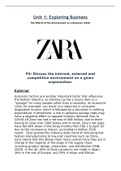Unit 1: Exploring Business
The Effects of the Environment on a Business (C&D)
P4: Discuss the internal, external and
competitive environment on a given
organization.
External
Economic factors are another important factor that influences
the fashion industry, as clothing can be a luxury item or a
"splurge" for many people rather than a necessity. An economic
crisis, for example, can result in a reduction in consumer
disposable income, which is followed by a decrease in clothing
expenditure. Furthermore, a rise in personal savings rates may
have a negative effect on apparel industry demand. Due to
COVID-19 Zara has had a net loss of 409 million, due to them
having to close over 1000 stores and in result, Zara’s net sales
have fell 44% down in the three months from Feb 1 to April 30
due to the coronavirus impact, according to Inditex 2020
report. Zara ignored the industry-wide trend of relocating fast
fashion manufacturing to low-cost countries such as China.
Zara claims that this allows them more control since they are in
charge of the majority of the steps in the supply chain,
including product design, production, and distribution (CNN,
2019). In the UK, 50% of Zara's products are made in Spain,
26% in the rest of Europe, and 24% in Asian and African
, countries. Clothing with a longer shelf life, such as simple t-
shirts, is outsourced to low-cost manufacturers mostly in Asia
and Turkey. (Business week, 2018)
Zara's sustainability is inseparably linked to the economic
stability of the regions in which it operates. Zara, for
example, takes advantage of the low-cost labour that is readily
available in Spain since it is predominantly a Spanish brand.
This helps them to retain profitability while still providing
affordable fashion to their loyal customers. Zara has managed
to stay relevant despite global economic uncertainty and global
financial slowdowns as it is a top fashion label that is both
fashionable and affordable.
Workers' rights and child labour laws are important to
recognise in terms of political aspects in the apparel industry in
order to establish a legal and sustainable work climate in
manufacturing (Suttle, 2011). Furthermore, several
manufacturers have settled themselves in developing countries
as a result of the spread of international trade. Import and
export taxes have a strong impact on the competitiveness of
international retailers in the fashion industry.
In terms of the sociocultural segment, consumers prefer to
spend more on healthcare, technology, education, travel, and
leisure than on clothes, which pushes apparel companies to
grow their businesses in an environmentally friendly manner to
meet consumers' demands (Jasuja, 2017).
Inditex have stated that it would step up its efforts to sell more
clothes digitally in order to compete with high-street rivals like
H&M and Uniqlo, Fast Retailing, as well as newer online-only
competitors like Asos and Boohoo in the UK, which have thrived
during the lockdown.
Customers change trends and desires often, but the whole
world of fashion is incorrectly associated with wastefulness.
This may be a big reason why a fast fashion brand like Zara is
scrutinised by customers. Since today's consumers are more
environmentally aware than ever, brands like Zara must pursue
sustainable practises to prevent negative consequences. Zara
has been organising and preparing to make all of its shops 100
percent environmentally friendly. The strategy lays out a




